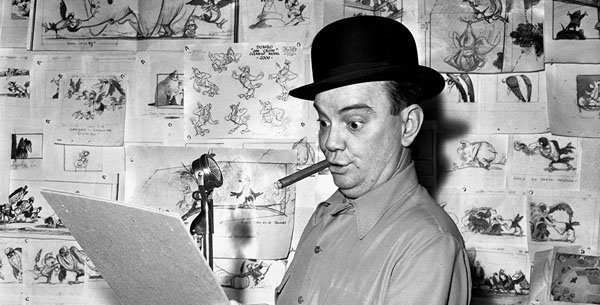
Suspended Animation #355
Clifton Edwards was born in Hannibal, Missouri on June 14th, 1895. Before the age of sixteen he was singing in St. Louis saloons and since many of these dives had no piano, he learned how to play the ukulele to provide his own accompaniment.
Edwards adopted the stage name “Ukulele Ike” after a waiter at the Arsonia Cafe in Chicago where Edwards was performing couldn’t remember his name and kept calling him “Ike”.
For a brief time around 1922, he teamed up with Lou Clayton doing a blackface act (that while grossly inappropriate and insensitive today was common practice for entertainment at the time) and received some recognition for achieving what one reviewer called a faithful degree of black speech nuances.
That was one of the reasons that animator Ward Kimball cast Edwards as Jim Crow in Dumbo (1941). As Kimball remembered, “We were recording the track for the Black Crows…and we got the Hall Johnson’s black choir from the Methodist church in Los Angeles for it and Cliff was the only white guy among them. Voice-wise, he really sounded more black than the blacks we had backing him up.”
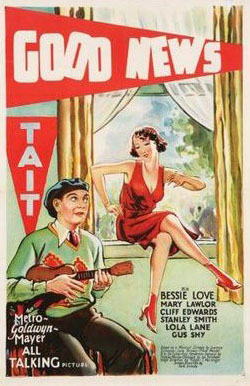 Between 1923 and 1933, Edwards recorded over one hundred and twenty sides for records and one account claims that during his career, he sold over seventy-four million records. It was around this time that he reportedly developed his weakness for cocaine, heroin, chorus girls, alcohol and gambling.
Between 1923 and 1933, Edwards recorded over one hundred and twenty sides for records and one account claims that during his career, he sold over seventy-four million records. It was around this time that he reportedly developed his weakness for cocaine, heroin, chorus girls, alcohol and gambling.
He also performed in the Ziegfeld Follies and earned extra income by appearing on radio including being a frequent guest of the Rudy Vallee Show. He also appeared in one hundred and five movies and introduced the song Singin’ In the Rain in the film The Hollywood Revue of 1929.
However, despite making a fortune even in the depths of the Depression, Edwards found himself in financial trouble due to taxes, gambling losses, and expensive alimony payments to three ex-wives that left him bankrupt three times over his long career. “He made millions and lost it all,” claimed Kimball.
Originally, the storymen considered that Pinocchio’s sidekick should be a bothersome termite since Pinocchio was a little wooden puppet. Fortunately, one of the storymen pointed out that the original story contained a cricket.
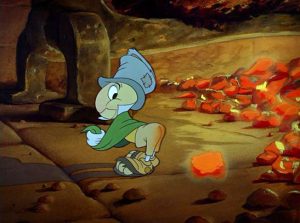 From the Disney publicity material from 1940: “When time came to name the new cricket character, everybody around the studio sent in names like Abner or Marmaduke or Cedric, but Disney said one day: ‘Why not name him Jiminy? Everybody knows that expression, Jiminy Cricket.’ The name was a natural, of course, and stuck from that minute on.”
From the Disney publicity material from 1940: “When time came to name the new cricket character, everybody around the studio sent in names like Abner or Marmaduke or Cedric, but Disney said one day: ‘Why not name him Jiminy? Everybody knows that expression, Jiminy Cricket.’ The name was a natural, of course, and stuck from that minute on.”
Edwards was the thirty-seventh person auditioned to do the voice of Jiminy. “At first, we made Jiminy sort of a pompous old fellow–kind of a windbag,” stated Walt Disney. However, once Edwards was cast, Walt said that Edwards’ smooth, upbeat performance had “so much life and fun in it that we altered the character to conform with the voice. Thus Jiminy comes to screen…lively and full of funny quips.”
Jiminy was so popular that he was the first Disney animated feature character to appear in another animated feature, as the onscreen narrator in Fun and Fancy Free (1947) singing the title song that was originally written for Pinocchio but never used.
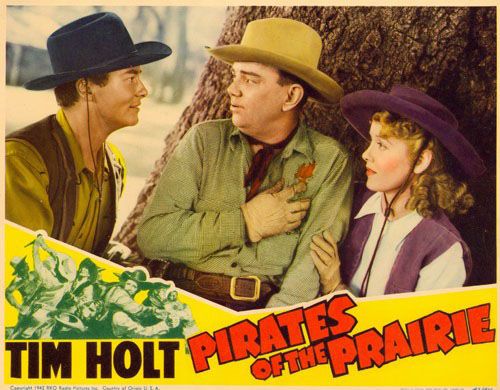
Edwards carved out a screen career – when not voicing Jiminy – as a comedy side kick in B-Western movies, along side hero Tim Holt, and Charles Starrett’s the Durango Kid.
Throughout most of the 1940s, Edwards was considered a show business has-been, although he did have a successful two year musical tour of Australia and the South Seas Islands.
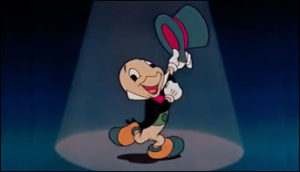 When he returned, he unsuccessfully tried to launch a nightclub career. However, the launch of the Disneyland television program in 1954 and the original Mickey Mouse Club the following year gave him a new professional start. A Disney publicity piece from the time quoted Edwards as saying “Looks like I’m going to be busy quite a while…”
When he returned, he unsuccessfully tried to launch a nightclub career. However, the launch of the Disneyland television program in 1954 and the original Mickey Mouse Club the following year gave him a new professional start. A Disney publicity piece from the time quoted Edwards as saying “Looks like I’m going to be busy quite a while…”
The Disney Studio used Edwards as the voice of Jiminy Cricket on several animated short segments on the original Mickey Mouse Club television show including the “I’m No Fool”, “Encyclopedia specials”, “Nature of Things” and “You (Are a Human Animal)” series but the money seemed to slip right through his fingers. He appeared in person several times to entertain the Mouseketeers including guest star appearances on November 15th, 1955, February 21st, 1956 and November 20th, 1956 shows.
In addition, Jiminy was the master of ceremonies on several of the hour-long weekly Disneyland television shows. (In later years, his function was taken over by Ludwig Von Drake.) Edwards also provided the voice for Jiminy for commercials including Baker’s Instant Chocolate (which was one of the sponsors for The Mickey Mouse Club show) and American Motors (one of the sponsors of the weekly Disneyland television show)
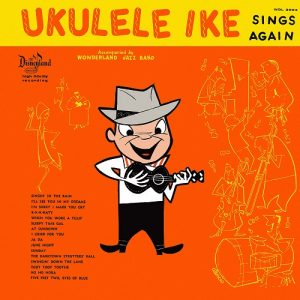 Edwards recorded many records as Jiminy for the new Disneyland records label.
Edwards recorded many records as Jiminy for the new Disneyland records label.
As Jimmy Johnson, the man in charge of Disneyland Records remembered, “I recorded Cliff as the Cricket on some of our Disneyland Records and he was paid royalties for those. But in his declining years—for Cliff was declining right before our eyes–I made some work for him on records which we really didn’t need.
“Toward the end, royalties from records were his only source of income. The last time he came into my office, he didn’t seem to know where he was or who I was. He was a sad and sorrowful sight that brought tears to my eyes. His housekeeper steered him out to her car. I never saw him again as he died shortly afterward.”
Ukulele Ike Sings Again is a 1956 Disneyland record suggested by Walt Disney himself to remind people of Edwards’ phenomenal early music career by showcasing some of his big hits of the past as well as a way to provide an extra source of income for the performer. Unfortunately, the album did not sell well and there were little royalties for the performer.
In 1967, the Disneyland record The Further Adventures of Jiminy Cricket was released and according to respected Disney musicologist and friend Greg Ehrbar “deteriorating health had caused Cliff Edward’s diction to become slurred and his brilliant comic timing to virtually evaporate in what would be his last Disney recording.”
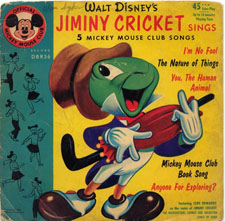 In his last years, Edwards sometimes spent his days hanging around the Disney Studio lot in hopes of more work and was occasionally taken to lunch by animators eager to hear his tales of the golden age of vaudeville.
In his last years, Edwards sometimes spent his days hanging around the Disney Studio lot in hopes of more work and was occasionally taken to lunch by animators eager to hear his tales of the golden age of vaudeville.
He entered a nursing home in Hollywood in 1969 as a charity patient supported by the Actor’s Fund and the Walt Disney Company quietly paid Edwards’ medical expenses as well.
At the time of his death from a heart attack at the Virgil Convalescent Hospital on July 17th, 1971 at the age of seventy-six, Edwards’ passing wasn’t reported to the public for several days because hospital officials didn’t consider it newsworthy since they didn’t know he had ever been famous.
His body was initially unclaimed and donated to the University of California, Los Angeles medical school. When Walt Disney Productions, which had been paying many of his medical expenses, found out about this, it offered to purchase the corpse and pay for the burial.
Thirteen years after Edwards’ death, Disney provided a marker for the performer’s grave when the lack of a proper headstone was reportedly brought to the company’s attention by the Ukulele Society of America. In addition to his name and years of life, the marker simply reads, “In loving memory of Ukulele Ike.”
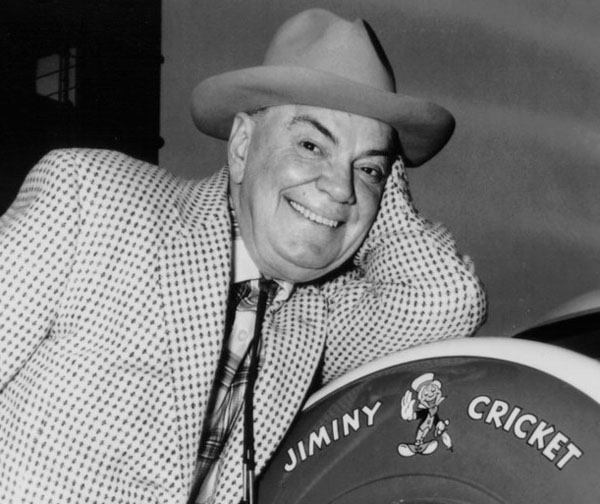


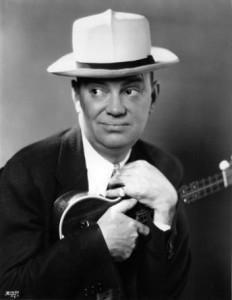
 Jim Korkis is an internationally respected animation historian who in recent years has devoted his attention to the many worlds of Disney. He was a columnist for a variety of animation magazines. With his former writing partner, John Cawley, he authored several animation related books including The Encyclopedia of Cartoon Superstars, How to Create Animation, Cartoon Confidential and Get Animated’s Animation Art Buyer’s Guide. He taught animation classes at the Disney Institute in Florida as well as instructing classes on acting and animation history for Disney Feature Animation: Florida.
Jim Korkis is an internationally respected animation historian who in recent years has devoted his attention to the many worlds of Disney. He was a columnist for a variety of animation magazines. With his former writing partner, John Cawley, he authored several animation related books including The Encyclopedia of Cartoon Superstars, How to Create Animation, Cartoon Confidential and Get Animated’s Animation Art Buyer’s Guide. He taught animation classes at the Disney Institute in Florida as well as instructing classes on acting and animation history for Disney Feature Animation: Florida.




















































Cliff Edwards came to Australia in 1952 for a four-week tour and ended up staying fifteen months, most of it as a headliner at the Celebrity Club in Sydney. At that time, hotel bars in most of Australia could not sell alcohol after 6 PM; this law, supported by the temperance movement, had been passed in response to a riot of drunken soldiers during World War I. (It also gave rise to the practice of after-work binge-drinking known as the “six o’clock swill”.) But under a loophole in the law, private clubs could serve alcohol until late in the evening. The Celebrity Club was owned by one Joe Taylor, head of an illegal gambling empire, and was frequented by underworld figures, corrupt government officials, crooked business leaders, and the like — a real Who’s Who of Sydney society. With unlimited access to gambling, narcotics, alcohol, and chorus girls, Edwards must have thought every wish he’d ever made on a star had come true. Recordings of some of his Australian radio broadcasts survive, and in them Edwards expressed a wish to remain in the country permanently. Why he didn’t, I don’t know; but it’s possible that, like Pinocchio on Pleasure Island, he wound up making an ass out of himself somehow.
In 1955 the state of New South Wales passed a referendum extending the hours for selling alcohol until 10 PM, but by that time Edwards was back in America.
PINOCCHIO was nationally re-released in 1971, and I saw the wonderful film numerous times that summer. The voice of Cliff Edwards singing “When You Wish Upon a Star” and “Give a Little Whistle” was in my head for months. When the news of his passing appeared in the paper that July, I wept.
There’s a famous, affecting moment in GONE WITH THE WIND in which we hear the halting, quiet voice of a dying soldier telling Olivia de Havilland about his youth and how he misses his brother. We never see the soldier… but it’s Cliff Edwards’ voice (he’s even billed in the film’s credits).
The terrific “Ukulele Ike Sings Again” was reissued on CD in the late ’90s, and I would unreservedly recommend it to all Cliff Edwards fans. Edwards was in fine voice, performing over a dozen period standards (like “Singin’ in the Rain,” “I’ll See You in My Dreams,” “Toot, Toot Tootsie”) with the lively backing of the Dixieland “Wonderland Jazz Band,” led by George Bruns.
I saw the film in 1971, heard of Cliff’s passing, and, also wept.I saw the reference to Cliff in person, thought person was “pirson”..anyway, I also had that Buena Vista album..;.I,of course, would also suggest that album to fans!
And let your conscience be your guide!sc
Edwards also had a 15 minute early TV show “The Cliff Edwards Show” which as local New York show in 1949-1950 for a few months I have film of 2 shows In the show he sings some of the hits from the 20’s and talks about his career
What a sad ending for someone who brought a lot of joy to peoples lives.